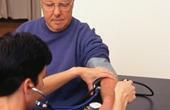Nutrition for chronic circulatory insufficiency

Adequate treatment of a patient with circulatory failure requires a differentiated approach to diet therapy, in the construction of which it is necessary to take into account the causes that caused this complication. Usually, the patient is prescribed diets № 10 and № 10 а, which have the properties to normalize the metabolism, while maximizing the discharge of the circulatory system. In addition, diet therapy is very much dependent on the degree of severity of circulatory failure. Severe circulatory insufficiency necessitates a significant limitation of both the quantity and quality of the foodstuffs used. In order to free the body of the patient from the accumulated under-oxidized metabolic products, it is necessary to reduce the caloric content of the diet, which unloads the digestive and circulatory organs. The diet uses easily digestible and easily digestible food, which also leads to easier digestion and reduces the burden on the heart.
The delay of sodium ions in the body is the main factor that causes the accumulation of fluid in the body and the development of edema. This is due to the increased ability of tissues to bind water( each gram of sodium causes a delay of 50 ml of water).Limiting the amount of fluid consumed and table salt is one of the necessary conditions for getting rid of swelling. At the same time, it is necessary to take into account the amount of liquid contained in milk, soups, kefir, and also in dense products - meat, bread, cottage cheese, potatoes in the form of bound water. For example, in curd contains 79%, in potatoes 56%, in beef 55%, and in bread 41% of water. This causes the need for concentrated cooked dishes. In addition, the diet should contain an increased content of potassium-rich foods. This chemical element has the property of enhancing the contractile ability of the myocardium. It is advisable to conduct potassium-free days( taking 5 times a day for 100 g of soaked dried apricots).This unloading diet contains 22 g of protein, 317 g of carbohydrates, and its calorific value is 1395 calories.
Also in the diet should be present in sufficient quantities of vitamins B and C, as the lack of blood circulation significantly reduces their number. Their additional intake improves the activity of the heart and the general well-being of the patient.
Nutrient-excitatory foods, such as coffee, strong tea, cocoa, alcohol and strong meat broths, should be excluded from the diet.
In order to reduce the burden on the heart, food should be taken in small portions 5-6 times a day. Dinner should be no later than 3 hours before going to bed, otherwise a full stomach, raising the diaphragm, makes it difficult to work the heart while in and in a horizontal position.
It is necessary to include in the diet include lactic products, honey, prunes, compotes, fruit and vegetable juices, fruit jelly to eliminate constipation. In addition, it is advisable to exclude fresh milk, fresh bread, legumes, and carbonated beverages from food to prevent swelling of the intestine.
Initial forms of circulatory insufficiency cause a need for a physiologically complete diet with limited content of table salt, liquid and nervous system-stimulating products. It is necessary to completely exclude canned food, pickles and sausages from the ration, in addition, dosing food is prohibited. In order to compensate for the taste of the food prepared without salt, it is recommended to add sour jam, parsley, dill and bay leaf to the dishes.
Materials used:
Shilov VN, Mits'yo VP"Healthy food"
